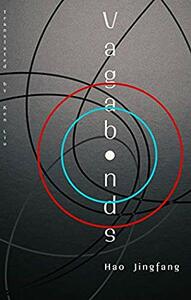Take a photo of a barcode or cover
Something about the writing style just didn’t work for me. Maybe it’s related to how it was a translation? And the audiobook I think made it a bit worse too.
adventurous
challenging
dark
emotional
hopeful
informative
inspiring
reflective
slow-paced
Plot or Character Driven:
A mix
Strong character development:
No
Loveable characters:
Complicated
Diverse cast of characters:
Yes
Flaws of characters a main focus:
Yes
Squarely upmarket, this book ruminates on a vast number of challenges with both colonizing mars and forming a new kind of society—once aspiring to be utopian, as much as one can be—as well as the practical, physical limitations of such a place and how that directly effects change; both consciously and otherwise.
A group of martians have lived on earth for a time during an armistice and now return home to the colony. There’s a cross pollination effect and the frame with which to present the colony as brand new to the reader, while juxtaposing it with people from, or interact with (like an envoy or ambassador, etc.), earth. It is a large, ensemble cast that we jump around to, with, more-or-less one “main” protagonist. With another one most often returned to.
Like all sci-fi novels I’ve consumed there are wars between earth, which maintains its free market capitalism thinking, and mars. But why I specifically mention it being upmarket is that this book is not at all concerned with giving (western) sci-fi readers genre tropes. There’s no plot heavy match to the final conflict. It’s not concerned with the granularity of time and charting A to B. It doesn’t hold your hand, basically. As pretty much all SFF fans have been completely conditioned for now. It’s also standalone, as far as I know. So this is not commercial fiction.
That’s what makes it so good. This is what people refer to as an idea book. And while not everything is long term strictly “pertinent”, mostly because it isn’t plot heavy, usually it’s digressions are a part of world building in bite-sized chunks, or an axis with which to further flesh out a characters ideology or philosophy, which is a proxy for the larger themes. It’s not east versus west ideologue battles, it’s more about finding something human in the perspectives of everyone, including your enemies. Because when you vilify an entire way of thinking you will, inevitably, hamstring your own thinking. And in long-term life and death of something like a colony, that’s a death sentence.
There are asides on plenty of scientific stuff I didn’t remotely know about and I found fascinating. The focus on humanity needing to look to larger problems than tribalistic tendencies and critically examine development is always good. It’s what the genre is there for, in part. And I like heavily interiority in my books. Lots of people mention it’s more literary and I mostly agree with that—except that the prose, while better than commercial fiction, are, again, upmarket. Literary would give those readers a false impression as well. It’s somewhere in the middle.
There is a resolution to a conflict and the ending felt right for the narrative. Overall, I liked it a lot. Defied my expectations in a pleasant way. It is certainly slow, because it floats from person to person. There is some tension, but because the expectations are defied early, you don’t really know how the book will go about resolving it. I was perfectly happy to float along and just find out more interesting philosophy and science. It’s not going to be for everyone, but it is my kind of thing.
Had the prose work been literary it would have been 5 stars. People describe as lyrical and I didn’t really find that. It’s pretty contemporary and dynamic, but there’s no a high degree of specificity or high diction, or a concern for musicality to the degree you’d see in literary fiction. I think it’s just been a while since Sanderson-esk, sterile, workmanlike prose have been seen in the SFF genre.
A group of martians have lived on earth for a time during an armistice and now return home to the colony. There’s a cross pollination effect and the frame with which to present the colony as brand new to the reader, while juxtaposing it with people from, or interact with (like an envoy or ambassador, etc.), earth. It is a large, ensemble cast that we jump around to, with, more-or-less one “main” protagonist. With another one most often returned to.
Like all sci-fi novels I’ve consumed there are wars between earth, which maintains its free market capitalism thinking, and mars. But why I specifically mention it being upmarket is that this book is not at all concerned with giving (western) sci-fi readers genre tropes. There’s no plot heavy match to the final conflict. It’s not concerned with the granularity of time and charting A to B. It doesn’t hold your hand, basically. As pretty much all SFF fans have been completely conditioned for now. It’s also standalone, as far as I know. So this is not commercial fiction.
That’s what makes it so good. This is what people refer to as an idea book. And while not everything is long term strictly “pertinent”, mostly because it isn’t plot heavy, usually it’s digressions are a part of world building in bite-sized chunks, or an axis with which to further flesh out a characters ideology or philosophy, which is a proxy for the larger themes. It’s not east versus west ideologue battles, it’s more about finding something human in the perspectives of everyone, including your enemies. Because when you vilify an entire way of thinking you will, inevitably, hamstring your own thinking. And in long-term life and death of something like a colony, that’s a death sentence.
There are asides on plenty of scientific stuff I didn’t remotely know about and I found fascinating. The focus on humanity needing to look to larger problems than tribalistic tendencies and critically examine development is always good. It’s what the genre is there for, in part. And I like heavily interiority in my books. Lots of people mention it’s more literary and I mostly agree with that—except that the prose, while better than commercial fiction, are, again, upmarket. Literary would give those readers a false impression as well. It’s somewhere in the middle.
There is a resolution to a conflict and the ending felt right for the narrative. Overall, I liked it a lot. Defied my expectations in a pleasant way. It is certainly slow, because it floats from person to person. There is some tension, but because the expectations are defied early, you don’t really know how the book will go about resolving it. I was perfectly happy to float along and just find out more interesting philosophy and science. It’s not going to be for everyone, but it is my kind of thing.
Had the prose work been literary it would have been 5 stars. People describe as lyrical and I didn’t really find that. It’s pretty contemporary and dynamic, but there’s no a high degree of specificity or high diction, or a concern for musicality to the degree you’d see in literary fiction. I think it’s just been a while since Sanderson-esk, sterile, workmanlike prose have been seen in the SFF genre.
adventurous
challenging
mysterious
reflective
tense
slow-paced
Plot or Character Driven:
A mix
Strong character development:
Yes
Loveable characters:
Yes
Diverse cast of characters:
No
Flaws of characters a main focus:
N/A
reflective
medium-paced
Plot or Character Driven:
Character
Strong character development:
Yes
Loveable characters:
Yes
Diverse cast of characters:
Yes
Flaws of characters a main focus:
Complicated
What does it mean to be “free” and what does “home” mean to those who have made a home in more than one place are two essential questions that this book explores. Incredible world building, character development, and plot.
Vagabonds by Hao Jingfang is a philosophy-driven story. In the book's opening, we meet a young group of Martians returning from a years-long cultural/educational exchange on Earth as well as a Terran delegation visiting Mars for the first time in years since a Terran-Martian world and the old captain of the solitary ship that travels between Mars and Earth. From there, the story loosely follows a selection of these characters through a series of slow-burn personal and political events that seem to happen less for the purposes of developing a character or climax than for the purposes of ruminating on different systems of governance, economics, culture, and religiosity. This makes Vagabonds quite unlike anything I've read recently, and I did enjoy Hao Jingfang's philosophizing about these subjects — though I suspect many readers will be put off by the lack of traditional (Western) plot/character devices such as the three act story. My biggest critique of this book is that there were several plot threads that were established in the beginning/early middle and were never resolved later // there were several plot threads that became prominent in the late book that weren't really established in the beginning of the book. Additionally, we seem to spend time with the wrong characters. People who become very important in the late book had very little 'screen time' earlier in the book. Some of the most emotionally impactful characters were side characters. Overall, I would recommend Vagabonds to fans of science fiction, philosophy, or politics, but one should not expect a plot-driven or character-driven experience.
challenging
reflective
slow-paced
Plot or Character Driven:
A mix
Strong character development:
No
Loveable characters:
No
Diverse cast of characters:
No
Flaws of characters a main focus:
No
adventurous
challenging
reflective
tense
slow-paced
Plot or Character Driven:
A mix
Strong character development:
Complicated
Loveable characters:
Complicated
Diverse cast of characters:
No
Flaws of characters a main focus:
Complicated
Disappointed by the absurd simplicity of Mars and Earth cultures. This book is meant to be a thought experiment about collectivism vs individualism but it comes across as a philosophy 101 class. Despite the setting of an interplanetary war the stakes felt very low. Boring and shallow characters.
setup is similar to the dispossessed - a non-earth colony has to use a different political system with less personal freedom (to some degree) to survive their harsher environment, while a recognizably capitalist and western home world looks on with disdain, and the protagonist, an academic from the colony, reflects on the differences between worlds after spending politically fraught time on the home world. I’m not sure if it’s the translation, but it felt like there was so much telling instead of showing that I just couldn’t suspend disbelief and sink into the prose. The Camus references dropped like large pianos onto a sidewalk: sudden and out of place.
Just read the dispossessed instead
Just read the dispossessed instead



